
Ultimate Guide to Nations
The Nations Themselves
One of the major difference between Old World and other 4x games has to do with whatever civilization you choose to play.
In other 4x games, Civs are generally monolithic entities. Each Civ has unique traits and a leader who is immortal. You have the same leader from start to finish.
That’s not how it works in Old World. Yes, each Nation has a set of unique abilities, Pagan shrines, and two Unique Units, but the leader your chosen Nation starts with will inevitably die of old age long before the game ends, and if you haven’t produced an heir by the time that happens, that’s it. The game ends.
With that in mind, you’ll need to get married and have kids, or adopt someone, and you’ll need to do that sooner, rather than later. Securing an heir by some means or another is of vital importance from one generation to the next. That’s how you create and build upon your legacy. It’s an important part of how you create the living history of the Nation you’re playing.
Also note that Nations in Old World specifically aren’t monolithic entities. You’re the King(or Queen), yes, but your rule is not absolute, or absolutely certain.
Each Nation you can select to play is made up of four noble families (vassal families), each with their own abilities and interests that stack with your overarching, Nation-specificabilities.
You get to pick any threeof these vassal families, combining the family bonuses in different ways to create a Nation that’s unique to your game, and ideally suited to how you play.
Here’s an overview of the nations you can play.
Quick Note on Building Unique Units
If you’re perplexed about how you actually build your Nation’s unique units, you’re not alone. Here’s how you do it:
To build the lesser of your UUs, you need a city with at least.
Developing Culture and you need to build a Stronghold in that city (which first requires building a Garrison).
The availability of these improvements are dependent on the number of Laws you have enacted. One lawis all that is needed to to build a Garrison, and four are required to build a Stronghold.
To build the stronger of your UUs, you need a city with at least Strong Culture and you need to build a Citadel, which requires that you have at least seven laws enacted.
Also note that some UUs require horses or elephants to build. If your chosen Nation has a UU with that requirement, then you’ll either need that resource inside the borders of the city you want to build the UU in, or you’ll need access to the Riders family (Rider family seatcan build UUs without access to the resource in question).
Assyria
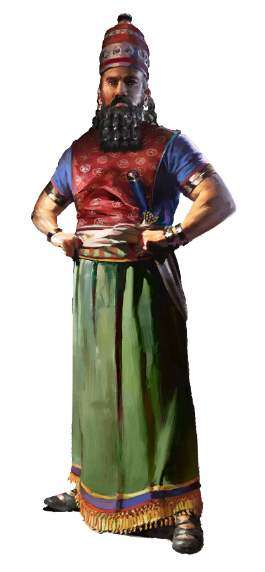
- Starting Leader: Ashurbanipal (an Educated Zealot).
- Starting Techs: Trapping, Administration, Military Drill.
- +2 Orders per military unit killed.
- New Units start with Focus I.
- +100% pillage yield.
What they’re good at
This Nationexcels at warfare. All of their units start with the “Focus I” promotion which gives them a 10% chance of scoring a critical hit in battle for double damage, per attack, and each time they kill a unit, the kill generates +2 orders.
Their special units, the Battering Ram and Siege Tower are the most powerful siege units in the game and can lay waste to even the strongest cities in short order. A tricky Nation for a beginner to play well, but well worth the effort to learn, and one of the “top tier” Nations in the lineup.
Vassal Families:
- The Champions.
- The Hunters.
- The Patrons.
- The Clerics.
Strategy Notes on Assyria
A single unit with a 10% chance to crit each attack isn’t all that impressive, but you can continue to buff that, taking Focus II, and then Focus III with future promotions, and many generals also increase crit chance. Having a dozen units with a 25% (or higher) crit chance is amazing, and this “Focus Pocus, where’d your army go?” power can grow to obscene heights if you nurture it.
This is the only civ in the game that offers both the Champions and the Hunters family and if you get a city site with lots of game or fish, a Hunter’s start will practically guarantee victory (Assyria with a game/fish heavy start is the only scenario I would recommend not choosing to settle your Capital as a Champions city).
Stonecutting as your first tech, and you’re off and running, and for as long as Ashurbanipal maintains his Zealot archetype, all your units willget an extra point of movement, making early game expansion a breeze.
If your starting city is Hunters, put Ashurbanipal at the head of the Slingers. If Champions, make him the governor of the city. I’d recommend against Patrons in favor of Clerics to get an early religion. Amazing civ, and my personal favorite!
For as long as your starting leader remains a Zealot, you’re on par with Rome in terms of mobility, but you should try for a 2nd Generation diplomat to give yourself time to consolidate your early game gains, then, rain death on anyone who gets in your way…
Babylon
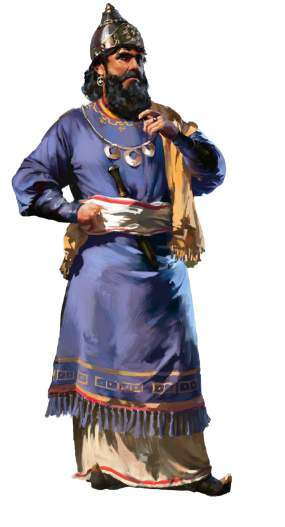
- Starting Leader: Nebuchadnezzar (A Prosperous Scholar).
- Starting Techs: Trapping, Administration, Rhetoric.
- All cities +1 science per turn.
- +2 culture per turn from Treasuries.
- +20% Growth.
Strategy Notes on Babylon
Babylon’s early game research is off the charts good, and this was my first favorite Civ before I fell in love with Assyria. You can quickly research all the basic econ techs, grab every bonus card and have a world-class army before everybody else is even firmly established, and once you start mass producing Akkadians and a bit later, Cimmerians, it’s game over.
As with the notes on Assyria, having 1-2 Akkadian/Cimmerian archers in the field is interesting. Massing half a dozen or more just makes enemy armies evaporate. You don’t even need siege engines. Your Unique Units are good enough to knock down any city’s defenses and damage everything around it, to boot. Awesome civ that lets you set the tone and play the game your way.
If you decide not to play as Babylon, watch them carefully in-game and do not let them get too big. If you do, you’ll have a tough time taking them out, owing to the immense strength of their Unique Unit.
Stone Cutting first and strongly consider building the Hanging Gardens with your bonus card stone as Babylon gets a 20% growth bonus in all her cities, and this will effectively double it.
Alternatively, building the Oracle will allow you to leverage free spy networks to quickly add to your impressive research capabilities once you get Portcullis.
In terms of families, your best games will probably involve Hunter’s starts with the Artisans and Sages in support, but with a Hunter’s start, the Traders are a viable addition to swap in, rather than the Artisans.
If your starting city site is no good for the Hunters, an Artisan start with Hunters/Sages is the next best, in my view. Very situationally, a Sages start might make sense, and this is the only time that “Centralization” might be a good play, in order to maximize science in your Capital. Otherwise, Sage/Tradercities should almost never be your first city, because your Capital already has to wear multiple hats and adding strategic Inquiries/Caravans can be tricky.
What they’re good at
Another top-tier Nation, Babylon’s main early game strength is the Wisdom of King Nebuchadnezzar, which gives Babylon the best early game research in the game. In fact, playing Babylon can spoil you, in that when you play anybody else, you’ll feel like the game is progressing in slow motion because the techs come so quickly here.
It gets better though, because as the Scholar archetype, Good King Neb can “redraw” techs on the tech selection screen, giving him, and you, the ability to navigate through the early game tech tree with a high degree of control, and that’s amazing.
On top of that, Babylon’s Akkadian and Cimmerian archers are among the best unique units in the game, amounting to nuclear bombs on the battlefield. At game start, they don’t have any compelling combat advantages, but you can get those critical early game techs so quickly that you can give yourself any sort of advantage you want or need.
Vassal Families:
- The Hunters.
- The Artisans.
- The Traders.
- The Sages.
Carthage

- Starting Leader: Dido (A Cunning Diplomat).
- Starting Techs: Trapping, Divination, Aristocracy.
- New cities +200 Civics.
- Can hire Mercenaries from Tribes.
- +10 gold per turn for each connected city.
What they’re good at
Everybody likes Dido, and the fact that she’s a diplomat makes it easy for you to stay on everyone’s good side during the earliest portions of the game when you’re weak and vulnerable.
Although Carthage isn’t quite what I’d call a “top tier” Nation, they don’t miss the mark by much, and they have such an incredibly different playing style that they’re just a blast to play. They have a totally different “feel” than every other Nation in the game.
They don’t have any obvious combat-oriented abilities like Assyria or Rome, but honestly, they’d be overpowered if they did, because they have a secret weapon: They’re the only Nation in the game that starts with the ability to hire barbarian mercenary units.
That, however, is an undertaking that requires a lot of gold, so your best bet, if you plan on making heavy use of that ability, is to focus on economic families (Artisans, Traders, and Statesmen), so you’ll have the money you need to undertake that kind of operation.
Unfortunately, that comes with a trade-off. It means you won’t be using the Riders family, and the Riders family is awesome. Without them, if you don’t have elephants inside your borders, you won’t be able to make use of Carthage’s excellent unique unit, an amped up war elephant.
Expansion with Carthage in the early game is usually easy. Just walk up to a barbarian camp, buy any barbarians that may have spawned, and use them to take the camp. Alternately, if you get an event in the early game that leads you down the path of a barbarian alliance, you’ll be able to settle cities on barbarian controlled urban tiles, paying for the privilege, naturally. Either way, that ability can easily see you out-expanding everyone around you, setting you up for a spectacular mid-game.
Note: In the strategy notes for this section, the point is made that you can’t normally assign generals to Mercenary companies hired from barbarian camps. There is one small edge case to consider. If you hire a Merc from say, a Scythian camp and you have allowed a Scythian character to marry into your Royal Family, those characters with Scythian blood can command Scythian mercenary units.
This doesn’t apply just to Carthage. If a Zealot leader captures a barbarian unit, or if an Orator leader buys troops, you can assign generals to those units the same way. Allow that tribe to marry into your Realm, and any character with that tribe’s blood running through their veins will be able to lead them.
Vassal Families:
- The Riders.
- The Artisans.
- The Traders.
- The Statesmen.
Strategy Notes on Carthage
If you pay even a nominal amount of attention to diplomacy, you’ll easily be able stay in the good graces of your rivals while you’re small.
Using the Artisans/Traders/Statesmen combination of families allows you to build a world-class economy very quickly, which allows you to hire tons of mercenaries, expanding quickly and putting together a decent, if odd-looking army.
There are two weaknesses to barbarian mercs, however. First, you usually can’t normally assign generals to them, so you’re still going to want to supplement them with your own, native troops to get some leadership in the field, and second, they’ve only got 2 Fatigue, so they’re not much good to you if you have to move them long distances (Side note: A third-generation Zealot leader for Carthage is deadly, because it extends the range of your barbarian horde to normal…).
Keep those two things in mind and you won’t miss, or even need your Unique Unit, if you happen not to be able to secure a source of elephants, though if you can, that’s icing on the cake. IMO, it’s just not worth guaranteeing yourself the use of your Unique Unit totake the Rider’s family, though I’m sure others will take a different view there. Economy is everything to Carthage in the early game. It’s what allows you to grow, because it gives you the money to hire those all-important mercs.
In a perfect world, your map will include an island with a barbarian settlement you can leave unconquered and gain access to a source of mercenaries for the rest of the game.
Tech wise, Carthage’s starting tech array has already unlocked a bonus card (Border Boost) which means you won’t get a great border boost and it will probably only impact 1-2 cities. Still worth getting, but weaker than most other Nations. Since that card starts the game in play, you don’t want to go Stonecutting first, and if you use the families I recommended, then getting the tech to unlock Treasury isn’t optimal since 1/3 of your cities will get them anyway, even without the tech, which makes Iron working your go-to starting tech here.
Egypt

- Starting Leader: Hatshepsut (An Inspiring Builder).
- Starting Techs: Ironworking, Stonecutting, Labor Force.
- +400 stone at game start.
- +40% productivity for farms along rivers.
- -25% to the cost of identical, adjacent tile improvements.
What they’re good at
Egypt is an economic powerhouse and the combination of the Landowners, Sages and Clerics make for a builder dream team, though if you want to guarantee that you’ll get to use Egypt’s strong, resource light Unique Units, you may want to swap in the Riders for one of the others. Doing this will, however, blunt your economy to a degree, so it is a tradeoff.
Egypt gets a bonus of 400 stone at game start, which is basically a free pass for the early game wonder of your choice. You can build an entire early game strategy around your wonder selection and run with it, if you like, and your starting techs allow you to startbuilding quarries on turn one, and make sure all your cities are road-connected early.
You get a starting warrior, so although this is not acombat-oriented Nation, you’ll generally have an easier time than some of your neighbors, since the early game barbarian tribes that aren’t horse-based start with missile units and you can cut their effectiveness in half by simply taking to trees adjacent to camps you’re attacking (If you start with a slinger and given that the AI knows enough to take cover, you can find yourself in an uphill battle as the AI will simply head to trees or scrub tiles and dramatically reduce the amount of damage you can deal – warriors don’t have this limitation).Egyptian farms built on rivers are a whopping 40% more productive, and you’ll see a 25% reduction in cost when creating identical, adjacent tile improvements. What’s more, as a builder, you can throw multiple workers at Wonders and finish them off very quickly, which is a nice perk that probably gets underutilized.
Also note that as long as Hatshepsut keeps her Builder archetype, all of Egypt’s workers will be produced 50% faster.
Vassal Families:
- The Riders.
- The Landowners.
- The Clerics.
- The Sages.
Strategy Notes on Egypt
In the early game, do everything you can to make nice with your neighbors, keep your head down and build your economy. With your bonuses, and the wonder (or wonders) of your choosing, you can very quickly build up an utterly dominant economy and use that to build up an utterly dominant army, if you stay focused. If you don’t, you’ll muddle through the middle game until you find your footing. Egypt basically plays itself if you keep your eye on the economy and your diplomatic relations.
Their Unique Units are good but fall short of being great. They do have the advantage of being delight fully resource light though, and that, paired with Egypt’s resource generation advantages, is a powerful one-two punch.
This is the only civ in the game that allows you to build a strategy around one or more early game wonders, because you’re the only civ in the game that’s guaranteed to get the one you want. Use that to your advantage. A Pyramids/Ziggurat play (both if you can get both) is heinously powerful, and plays into your civ’s natural strengths…
Greece
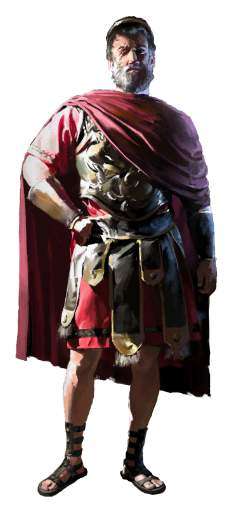
- Starting Leader: Philip (A Bold Commander).
- Starting Techs: Ironworking, Stonecutting, Drama.
- Unlocks Olympiad.
- All cities get +2 Culture per turn.
- -25% to the cost of building Settlers.
What they’re good at
Greece is a militaristic Nation that can walk and chew gum at the same time.
Since their powers are divided between military and culture, I’d rate them as falling just shy of top tier. Very good, very strong Nation, but not quite head of the class in the same way that Babylon, Assyria, and Rome are.
Greece starts with a warrior and has access to the Champions family, which gives them a fairly easy early game vs. the barbarian tribes. Their Unique Units are excellent, and deadly against cavalry units, but more oriented toward defense than most other Unique Units. If you try to use them purely as a sword against anything other than cavalry units, you won’t be getting the most out of them that you could be.
Additionally, Prince Alexander is a fearsome leader indeed, with a staggering Courage score, which makes him a devastatingly effective general. His stats, combined with his “Launch Offensive” ability gives the Greeks a huge leg up.
Greece gets extra culture in all their cities, their settlers are 25% cheaperand they can build the Olympiad, which provides extra Training Points, giving you a wonderfully well-rounded (guns and butter!) set of abilities.
Vassal Families:
- The Champions.
- The Artisans.
- The Patrons.
- The Sages.
Strategy Notes on Greece
Since Greece’s abilities straddle both the offensive and defensive side of things, you’ve almost got to take a balanced approach to gameplay. Starting with a warrior and Champions (there’s almost never a reason not to found your Capital as Champions) gives you an easy time against early tribal sites which makes early game expansion a snap, and if you start near someone with a cavalry-based Unique Unit, or a civ that’s just knownfor using mounted units heavily, you’re in luck, because your Unique Unit will eat them for lunch.
You don’t fare as well against Legions and Cimmerians, however, and if you start near Babylon or Rome, and you let them get too big, it could spell trouble, because you can’t research as well as Babylon, and you’re not as militarily oriented as Rome, but a steady, balanced, sensible approach, applied consistently over time will set you up for success.
Also note that since you generate culture faster than just about everybody, your cities will get culture boosts and cultural events that much more quickly and you’ll be able to build mid and late game wonders before others, for the most part, which should help you carve out a path to victory. In terms of families, Champions are a must, but after that, it’s a wide open field and all three of the other families are excellent pairings, depending on the kind of game you’re interested in playing. Greece is probably the most balanced civ of the lot, which is mostly a good thing but it does mean that you’ll likely want to adopt a very balanced playing style with them.Tech-wise, I’d recommend Divination first. Greece has some very good shrines that boost money, Civics, science, and orders, and you need more of all of the above, as quickly as you can get them.
Persia

- Starting Leader: Cyrus (A Tough Hero).
- Starting Techs: Ironworking, Trapping, Animal Husbandry.
- +50% yields from resource harvesting.
- -25% cost for ranged units.
- +0.5 order for each Pasture improved
What they’re good at
Although I wouldn’t rate Persia as a top-tier Nation, they only miss that mark by a half step or so (like Greece in that regard).
Persia presents a wide open field of play. They get a 50% bonus to harvested resources (harvesting special tiles outside your territory) which gives you a nice, if orders-intensive way of picking up extra resources to speed economic development.
They’re also the only Nationin the game that can train both warriors and slingers from turn one, which gives you a tremendous amount of early game flexibility, and although they don’t have any obvious combat advantages like Nations that have access to the Champions family, they do have an ace in the hole in the form of Cyrus himself.
Cyrus is a Hero archetype, and if you makehim the general of one of your units, then he can do something absolutely magical. He can “Launch Offensive” if you spend 600 Training Points.
That means that he, and any units immediately adjacent to him can attack, then Launch offensive and (orders permitting, of course) everybody can attack a second time in the same turn. Additionally, you gain +1 Order for each unit in that AoE.
That’s huge. That’s powerful. Used well and wisely, that ability alone can put you in a dominant position during the course of Cyrus’ life.
Persia also gets an extra half an order from every pasture they build. That doesn’t sound like much, but it’s a passive bonus that’s “always on” and not combat dependent like Assyria’s, and it grows over time, so by the mid game, you’ll probably find yourself with a comfortable cushion of orders, allowing you to accomplish more from turn to turn than your rivals…
Then there’s the Persian Unique Units. While these aren’t quite as amazing as Babylon’s they run a very close second and are the only unit in the game that can “rout” an enemy unit from range. Crazy, hatefully powerful units that will allow you to simply steamroll the opposition.
Vassal Families:
- The Riders.
- The Hunters.
- The Clerics.
- The Statesmen.
Rome
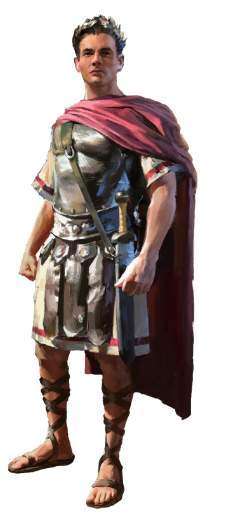
- Starting Leader: Romulus (A Ruthless Tactician).
- Starting Techs: Ironworking, Stonecutting, Polis.
- +1 Fatigue limit.
- All cities get +2 Training per turn.
What they’re good at
As you play more games of Old World, you’ll start noticing a trend. Pretty much any time Rome is in the game, they’re at, or near the top of the power chart.That’s because Rome is one of the strongest, if not the absolute strongest Nationin the game. Playing as Rome is almost like playing at a difficulty level lower than the one you selected.
This isn’t just a combat-oriented Nation, everything about Rome is geared toward making killing your rivals easier.
You have access to the Champions family, which gives you access to units with Steadfast for a +25% bonus against barbarians. All your units get an extra point of movementand all your cities generate +2 additional Training Pointseach turn. Not enough for you? Okay, well, owing to the fact that Romulus is a Tactician archetype, all your rangedunits are invisible in friendly or neutral trees, and if you put Romulus in charge of a military unit, an attack from his unit will “stun” whatever you hit, rendering it unable to counter attack on the following turn.
Simply put, Rome was designed to bring death to anybody they run across, but especially to barbarians, which makes the early game a breeze.
Even Rome’s Pagan shrines are combat oriented with two of the four providing yet more Training Points.This Nationcan fight. Anyone. Everyone. They’re amazing.
There is one potential drawback, however. The techs they start with unlock two bonus cards, so there is a chance that you’ll miss out on some freebies as you may be forced to choose between the free stone or the free settler. In that case, you’re almost always better off to take the free settler and expand more quickly, but that means you may miss an important early game wonder.
Vassal Families
- The Champions.
- The Landowners.
- The Patrons.
- The Statesmen.
Strategy Notes on Rome
The best way to leverage Rome’s combat strengths is to work on improving your research capabilities from turn one and don’t take your foot off the gas pedal till you’ve got better tech than everyone else.
The combination of your inherent military strength plus better tech spells doom for literally everyone.Roman zealot leaders in the mid/late game are terrifying because that leader archetype will give all Roman units FIVE points of movement every turn, or almost double what everybody else has, allowing you to march anywhere, seem to be everywhere at once, and to exterminate absolutely anything that gets in your way.
Your Unique Units are exactly what you’d expect them to be. They’re not flashy or showy, but they are brutally effective at carving giant, gaping holes into the enemy’s ranks, and Testudo gives them protection against enemy missile units. Tough customers.Rome is literally the only Nation in the game you’d even consider passing on the Champions family. It’s entirely possible to take all three of the others, and focus on the economy because your inherent civ strengths mean you don’t really NEED Champions (though if you take that family, then you’ll be even more militarily focused, which isn’t a bad thing at all). My personal favorite combination is Champions/Statesmen/Landowners, though Patrons can be swapped in for Landowners and you won’t lose a bit of effectiveness (it will just shade your game differently). A super robust, durable civ that’s fun to play.
Tech-wise, I’d start with Divination to unlock Shrines and give you yet more sources for Training Points and somecash. Turn one, start hunting and don’t stop!
Strategy Notes on Rome
The best way to leverage Rome’s combat strengths is to work on improving your research capabilities from turn one and don’t take your foot off the gas pedal till you’ve got better tech than everyone else.
The combination of your inherent military strength plus better tech spells doom for literally everyone.
Roman zealot leaders in the mid/late game are terrifying because that leader archetype will give all Roman units FIVE points of movement every turn, or almost double what everybody else has, allowing you to march anywhere, seem to be everywhere at once, and to exterminate absolutely anything that gets in your way.
Your Unique Units are exactly what you’d expect them to be. They’re not flashy or showy, but they are brutally effective at carving giant, gaping holes into the enemy’s ranks, and Testudo gives them protection against enemy missile units. Tough customers.
Rome is literally the only Nation in the game you’d even consider passing on the Champions family. It’s entirely possible to take all three of the others, and focus on the economy because your inherent civ strengths mean you don’t really need Champions (though if you take that family, then you’ll be even more militarily focused, which isn’t a bad thing at all). My personal favorite combination is Champions/Statesmen/Landowners, though Patrons can be swapped in for Landowners and you won’t lose a bit of effectiveness (it will just shade your game differently). A super robust, durable civ that’s fun to play.
Tech-wise, I’d start with Divination to unlock Shrines and give you yet more sources for Training Points and somecash. Turn one, start hunting and don’t stop!


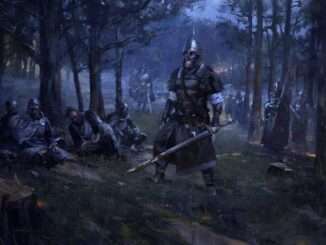


Be the first to comment